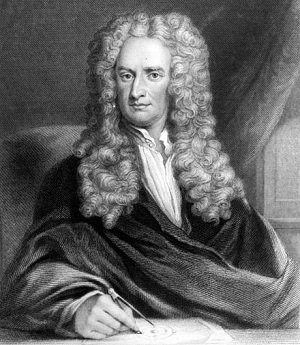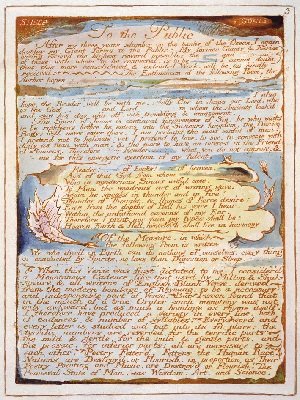The Romantics |1| William Blake (The Hipster)
It was the best of times it was the worst of times (and a time of anachronistic literary references apparently). The Enlightenment. Never before had mankind been so purposeful in its great venture to shine the clarity of reason upon the wilderness of nature, upon the hysterical madness of women, upon all the surface of the world, nay upon all the fabric of the universe itself! Reason. Logic. Clarity of thought. These were the qualities which drove truly enlightened thinking. Gravitation. The Scientific Method. Algebra. Mathematics. Overzealous Use of Capital Letters. These things would lead mankind forward and onward into progression until finally we, the men that is, would reach the pinnacle of knowledge, the imaginary point to which all scientific endeavour inevitably leads, when we will finally occupy the place of the omnipresent God that we have proven doesn’t exist.

Science lads; it’s a load of hocus pocus. The Romantics were well aware of this. While Newton was busy wasting time on his equations and the industrialists were cramming orphans into the workhouses the Romantics were busy not wearing any shoes and smelling all the flowers they could get their pretty little hands on. Of all the poetic movements which have existed Romanticism is the one which helped establish the idea of the poet as the waifish, emotionally truculent, shoeless, penniless, star gazing youth. For that fact alone it should be readily applauded. The poetry itself isn’t half bad either.
A reaction against the rational Romanticism was rooted in the emotional, the power of the individual imagination, and in the sublime and often overpowering beauty of nature. The poets who lead the movement were a bizarre and mismatched lot who led fascinating lives full of raunchy drug fuelled sex parties between which they wrote poetry about truth and beauty and nature. There was one, however, who was a romantic well before it was cool…
William Blake – The Hipster
William Blake was a lot of things. He was a poet. He was a painter. He was a religious fanatic. He was an absolutely crazy mother fucker. Here’s a little taster of what Blake was writing back in the day;
Bring me my Bow of burning gold; Bring me my Arrows of desire: Bring me my Spear: O clouds unfold! Bring me my Chariot of fire! I will not cease from Mental Fight, Nor shall my Sword sleep in my hand: Till we have built Jerusalem, In England’s green & pleasant Land

[pullquote] Now before all you atheists start getting your secular knickers in a twist it’s important to look at exactly what philosophy Blake was pushing. [/pullquote] What does this mean? Honestly I don’t know. All I do know is that I want to have a sword fight right fucking now. As I’m sure you can tell from that passage Blake is the fire and brimstone type. Now before all you atheists start getting your secular knickers in a twist it’s important to look at exactly what philosophy Blake was pushing. The passage above is taken from the preface to Milton: a Poem in Two Books which is itself entitled And did those feet in ancient times. In Milton Blake hooks up with John Milton who famously wrote Paradise Lost, which is in turn based on Dante’s Divine Comedy. The thread which runs through all of these texts is that they aim to rework established religious doctrines which culminates in the recasting of Satan as a sympathetic or tragic protagonist in literature. Moral of the story? God is a dick.
Blake’s work is all about this personal interpretation of divinity. In his collection Songs of Innocence and of Experience he sets out to understand the work of God in all its complex glory contrasting, you guessed it, ignorance with experience. One of his most famous poems is The Tyger a companion piece intended to be read alongside The Lamb. In The Lamb we see God portrayed in the traditional manner as being kind and nice and somewhat boring;
He is called by thy name,
For he calls himself a Lamb:
He is meek & he is mild,
He became a little child:
Blake is talking about Jesus and how he did humanity a solid and died for everyone’s sins. Thanks Jesus. This, however, isn’t enough for Blake who can see the work of God in all things, not only the pastoral, nice, and pleasant and this is where The Tyger comes in. The tiger is fierce, terrifying, and made to kill but for Blake the tiger is equally an expression of God’s divine will as the lamb;
When the stars threw down their spears
And water’d heaven with their tears:
Did he smile his work to see?
Did he who made the Lamb make thee?
For Blake the teachings of the church, the insistence that God is some sound lad hanging about the cross or chillin’ on his cloud, ready to forgive everybody everything is not an accurate one. God is in all things be they good, be they bad, be they meek, or be they terrifying. This led Blake to rebel against the dogmatic teachings of the church in particular against the understanding that the expression of base or earthly desire (SEX) was a sinful practice. How could these practices be sinful when they, like everything else in the world, were the work of God? In his work The Marriage of Heaven and Hell Blake sets out his thoughts on the matter fairly plainly;
Prisons are built with stones of Law, Brothels with bricks of Religion.
The pride of the peacock is the glory of God.
The lust of the goat is the bounty of God.
The wrath of the lion is the wisdom of God.
The nakedness of woman is the work of God.
Whatever Blake is preaching; sign me up. As Blake continued to write (as well as illustrate and print all of his work) he eschewed the institutionalized teachings of the church and, this is where things get really wacky, developed his own personal mythology rife with ambiguous symbols and historical and literary references. This mythology features its own system of Gods and virtues and vices and is best captured in Jerusalem The Emanation of the Giant Albion. Here Blake details how Albion, representative of mankind and Britain, came to be, relates Jerusalem as a utopic setting which exists beyond war, bigotry, and dogma. Blake takes things right back to the beginning writing his own creation myth;
There is a Void, outside of Existence, which if enterd into Englobes itself & becomes a Womb, such was Albions Couch A pleasant Shadow of Repose calld Albions lovely Land

The pages of Jerusalem are packed with text and illustrations and the work itself features several full page prints. All of this work was done by Blake, his commitment to his art is definitely above reproach, but having said that he undoubtedly also an absolute crackpot. Fair play Will.
Writing, or preaching, before anyone was aware of ‘The Romantics’ Blake was leading the way in alternative thought at a time when the church had massive sway over the public consciousness. His idiosyncratic writing and ideas paved the way for other players to think freely about writing, about love, and about life in general. Many don’t consider Blake to be part of the Romantic movement but the ideas which he was purveying would eventually be adopted and expanded upon by the movement. Sublime supplication in the face of forces greater than man and the individualist approach and imaginative interpretation of accepted thought weren’t going anywhere anytime soon.
All this bible bashing and fire and brimstone style preaching would inspire other poets into accepting the doctrine and rally the Romantic cause. Two poets in particular would take up the mantle and with a single publication kick open the doors of literature with an opium pipe in one hand and a bunch of daffodils in the other, heralding the arrival of Romanticism in all its debauched glory.

